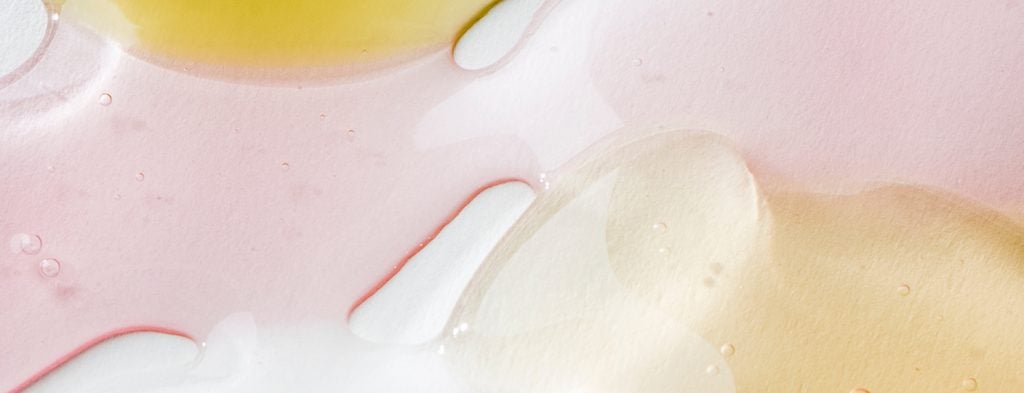Have you ever walked down a store aisle searching for a new moisturizer only to be overwhelmed by all of the different choices you must make? First, you have to decide on which brand you want to purchase. Then, you’re faced with another decision: should you buy an oil or water-based moisturizer? And what’s the difference between these formulations anyway? It’s obvious that one contains water and the other contains oil, but is that the only difference? Keep reading to learn how oil and water-based moisturizers are different and why it’s important to choose the right formulation for your skin type.

What Is A Water – Based Moisturizer?
The OH and NH2 groups hydrogen bond with water, essentially “grabbing” it and holding it on the skin. Humectants slow water from evaporating and therefore keep the skin hydrated. Examples of humectants include glycerin, amino acids, peptides, urea, and hyaluronic acid.
A water-based moisturizer may also include oil to help prevent the evaporation of water. Yes, you read that right: it is common for water-based moisturizers to contain oils or other occlusive emollients to lock in moisture. If don’t want to use any oil on your face due to fear of shine or breakouts, look for an oil-free, water-based moisturizer for face.
The term “water-based moisturizer” actually may refer to a water cream, lotion, or gel. The primary difference between these products is the amount of water in each, which subsequently affects the texture.
Creams have the least amount of water and thus have a thicker consistency than both lotions and gels. A water-gel moisturizer contains a high water content, which makes them lightweight and much thinner than creams and lotions.
Water-based lotion falls in the middle of creams and gels; they have more water than creams but less than gels. If you’re looking for a lightweight moisturizer, a water-based lotion or gel is most likely going to be the best option.

What Is An Oil-Based Moisturizer?
With an oil-based moisturizer, all of the ingredients are dissolved in an oil base. You can easily tell if a moisturizer is water or oil-based by looking at the ingredient list. If the first ingredient is water, it is a water-based moisturizer.
If the first ingredient is an oil, such as jojoba oil or sweet almond oil, it is an oil-based moisturizer. An oil-based moisturizer may refer to a thick cream, ointment, body butter, or face or body oil. Once again, the main difference between these moisturizers is the amount of oil and the texture. We mentioned above that many creams are water-based moisturizers.
However, if a cream contains a higher concentration of oil than water, it is classified as an oil-based moisturizer. Ointments have a high concentration of oil (compared to creams), which means they are thick, greasy, and occlusive. Ointments are typically used as skin protectants for very dry, cracked skin.
Body butter has a rich, buttery texture, and is thicker than a cream but not as thick as an ointment. A face or body oil can be just one oil, such as jojoba oil or rosehip seed oil, or a blend of oils.
Related: Best Moisturizers For Oily Skin
Is One Formulation Better Than The Other?
Now that you know the difference between an oil and water-based moisturizer, you may be wondering if one formulation is better than the other. The answer to this question isn’t a simple yes or no. Rather, the formulation you choose depends on your skin type and what type of condition you are treating. One of the most important factors to consider before choosing a moisturizer is whether your skin is dry or dehydrated. You may think that these two words are synonyms, but they actually indicate two different skin conditions.
Dry skin means that your skin produces less sebum than normal. Sebum is the natural oil produced by glands in your skin that functions to lubricate the skin and act as a waterproof barrier. Dry skin can also occur if the skin’s lipid barrier is depleted. The lipid barrier contains about 50 percent ceramides, 25 percent cholesterol, and about 10 to 15 percent fatty acids. Without these essential lipids, the barrier is weakened and the skin becomes dry. Overall, dry skin will look visibly dry and flaky, and can even be rough, cracked, and itchy. Dry skin can also lead to signs of aging, such as fine lines and wrinkles.
In contrast, dehydrated skin is caused by a lack of water, not a lack of oil. Specifically, the skin’s Natural Moisturizing Factor (NMF) is what becomes depleted. The NMF is primarily composed of free amino acids and various derivatives of these amino acids that work together to maintain adequate skin hydration.
The NMF can become depleted with age, as well as due to factors such as poor diet, excessive sun exposure, makeup, incorrect product use, sensitizing ingredients, and many more. But here’s where it can get confusing: When skin is dehydrated, it produces more oil to compensate for the insufficient water. This is why skin can feel dry and oily at the same time. When this occurs, problems such as acne breakouts, irritation, and dry patches can develop.
Related: Best Moisturizers for Dry Skin
Who Should Use A Water-Based Moisturizer?
A water based moisturizer is best for those with dehydrated skin that is in need of moisture. Ingredients such as glycerin and hyaluronic acid are often used in water based moisturizers, and they can deliver powerful hydration to dehydrated skin.
Plus, these water based ingredients can provide temporary anti-aging benefits. This is because the extra hydration is extra volume, which effectively plumps out the skin and makes lines and wrinkles less noticeable.
However, this effect is transient – as soon as the moisture content in skin decreases, lines and wrinkles will return to normal size. Lastly, water-based moisturizers are a great choice for hot climates and summer months because they are typically more lightweight than oil-based moisturizers.
Who Should Use An Oil-Based Moisturizer?
An oil-based moisturizer is best for those with dry skin that has a damaged barrier or lacks sebum. The oil-based ingredients will help to replenish the skin’s barrier function. Many oils also contain vitamins and fatty acids that impart anti-aging benefits.
For instance, rosehip seed oil contains provitamin A, mostly as beta carotene. Beta carotene has the ability to increase cell turnover and promote regeneration in the outer layers of the skin. Over time, this can help even out skin tone and add a “glow” to the skin. So this oil-based moisturizer not only helps to replenish the skin’s lipid barrier but also provides a youthful glow to skin.
Contrary to popular belief, most oils and oil-based moisturizers will not clog your pores and cause breakouts. Actually, quite the opposite is true. The theory with using oils on breakout-prone skin is that they actually help balance your skin’s sebum production, and help your skin’s own oil flow more freely (instead of clogging in the pore).
If you have oily or acne-prone skin, the most important thing to look for when choosing an oil-based moisturizer is “non-comedogenic”, which means it will not clog pores. Examples of non-comedogenic oil-based ingredients include jojoba oil, linoleic acid, argan oil, and grapeseed oil.
Lastly, oil-based moisturizers are a great choice for cold climates and winter months. The combination of windy, cold, dry weather outside and humidity-depleting heaters indoors can cause skin to become dull, ashy, and dry. An oil-based moisturizer with a thick texture can protect the skin from these conditions.
References:
WellandGood.com “I Used Face Oils for Acne for a Month and This is What Happened” Oct 2016, HuffPost.com “The Best Products to Moisturize Seriously Dry Skin” March 2017








